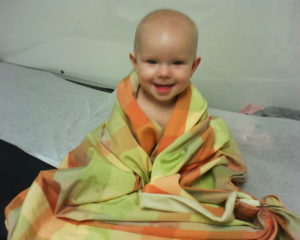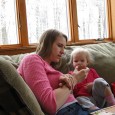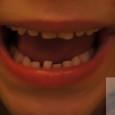Yesterday Doodle had his 10 month well visit with the pediatrician. We’ve taken our kids to the same doctor since Honeybun was a few days old and even during the time we were living in Dublin, we still kept up with our well-visits with our pediatrician in Florida (Honeybun never missed a single check! Though Sugarplum did have most of her infant checks in Ireland). So, after over 10 years (all children combined) of doctors’ visits, going is more like meeting with a family friend than a stress-inducing medical ordeal.
Our pediatrician knows me now. “I assume you’re still exclusively breastfeeding?” Yep. “He’s been healthy? Your children have always been in good health overall” Yep. “Baby dropped to 6% on his weight, but all your kids are tall and slim so you know that’s nothing to worry about.” Yep. “At this point it’s most important that baby is starting to understand what you are saying. What he is saying, or not saying isn’t a concern right now.” Yep. “If he’s pulling to stand and pushing things, I’m sure you know he’s getting close to walking.” Yep. “Of course, walking is considered normal up to 15 months and if he does it before a year that’s considered early.” Yep. “I see the two bottom teeth came in, but no sign of anything up top which are typically the next to come in.” Yep (and nope, no signs of top teeth!)
Our conversations are usually short and sweet. I usually have very few questions and he usually has very little to tell me that I don’t already know (even with Honeybun, my childcare experience and personal research left few doctor’s office surprises!)
And though our visits almost always go smoothly, there are a few tricks I’ve picked up along the way that make the process and visit easier for everyone.
1) Find a doctor you like and then stick with him/her. We used to travel across the ocean to see our pediatrician and now I travel 15-25 miles to see him because he is a good fit for us. He believes in breastfeeding, knows that my children tend to drop off the weight curve as they grow and is not in a hurry to prescribe antibiotics which are all things that are important to me. Do I wish he were closer, especially when my kids are sick? Of course, but the drive is well worth it!
2) Schedule your appointments first thing in the morning or right after lunch if possible and avoid Mondays for well visits as all the kids who were sick over the weekend show up Monday morning which can back up the schedule and create more germ sharing opportunities. Just like any other doctor, pediatricians can easily get backed up and waiting an extended time with a restless infant or toddler is worse than waiting most places. Taking the first appointment gives you a better chance of getting in on time and out in a reasonable amount of time.
3) Schedule your appointment around baby’s schedule when possible. Don’t try to do the doctor thing during baby’s usual nap time or a toddler/child’s usual meal time. If it’s going to overlap a baby’s feeding time, be prepared to feed at the office before the appointment, while waiting for doctor or nurse and/or after the appointment before heading out (a lot of pediatricians will let you hang out and use the exam room to nurse after your appointment).
4) Try to be early (or at least on time—I struggle with this one!). Every office’s procedure is different but if you’re late it’s possible the person with a later appointment that shows up early could get taken back ahead of you which will just prolong your time at the office.
5) Expect to wait. Unfortunately even if you have the first appointment of the day and arrive early, there will still be some waiting involved. You’ll have to wait for the doctor to come in; if you vaccinate, you’ll have to wait for the nurse to draw the vaccination after the doctor makes sure baby is healthy enough; if you need to schedule another appointment you might have to wait to do that. Basically, be prepared for the long haul. Bring toys, snacks, a boob, a bottle or whatever else keeps your baby happy and entertained
6) Be flexible with baby’s needs and relax your usual rules. I give my babies unlimited boob access while at the doctor just to keep them from enduring more trauma and stress than the visit will provide on its own and my big girls always want to suck on the flavored tongue depressors. I try not to argue with them and give them most things they want just to keep the peace (and quiet!) during the already stressful situation.
7) Dress your child in clothes that are easy to put on and off. Since you’ll have to strip a baby down to be weighed and an older child for their check-over, make sure to dress in clothes that can quickly and easily be put on and off. Weather permitting, I recommend a dress for girls who are getting shots as you’ll have to leave your child’s leg exposed and doing up snaps or wrestling pants onto an upset baby is no fun! (Boys are less convenient, unfortunately!)
 8) Bring something warm to wrap baby up. Doctor’s offices or notoriously cold and since your baby will spend a good amount of time waiting in the nude, be sure to have a blanket or something else warm and easy to wrap baby up in (I usually just use my sling that I carry baby into the office in).
8) Bring something warm to wrap baby up. Doctor’s offices or notoriously cold and since your baby will spend a good amount of time waiting in the nude, be sure to have a blanket or something else warm and easy to wrap baby up in (I usually just use my sling that I carry baby into the office in).
9) Be ready to sooth your baby after all the poking of the exam and especially if receiving shots or blood draws. Have a lovey, pacifier, boob, bottle or whatever else soothes your baby ready to give baby as soon as you can. I also like to hold/kiss/cuddle/shhh my babies when they have to be poked and as soon as they are done, I don’t worry about them associating me with the pain, I want them to associate me with making them feel better, though.
10) Write down your questions (this is another one I’m terrible at). Nothing is worse than realizing your forgot to ask a question as soon as you get to your car! Write them down and you think of them and be sure to take your list with you.
11) Don’t be afraid to ask questions, no question is a stupid question when it comes to the well-being of your child! (And if you’re uncomfortable asking a question, see #1 and find a doctor you’re comfortable with!)
12) Bring help if you have more than one child being seen or if you have an extremely sensitive or strong child (like when I was pregnant with Doodle and Honeybun went in for her flu shot, I made hubby come to help hold her still after the nurse and I were unable to hold her to prick her finger for a blood draw a few months before).






